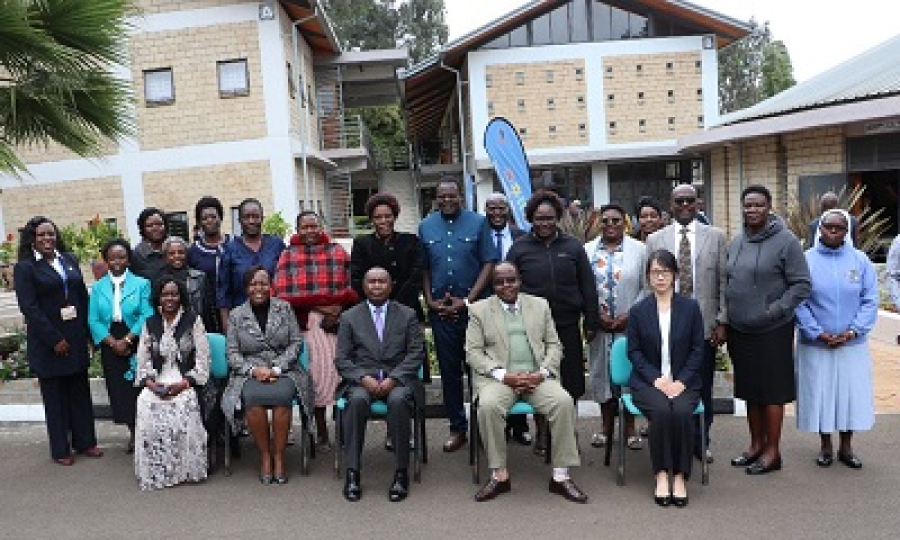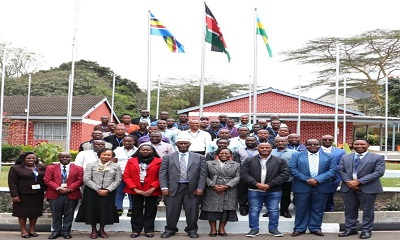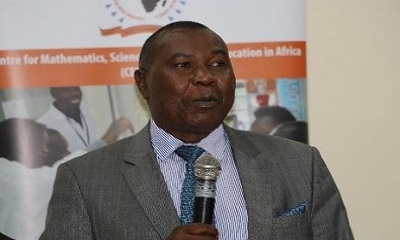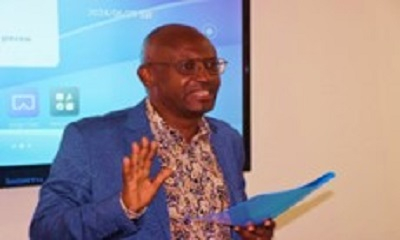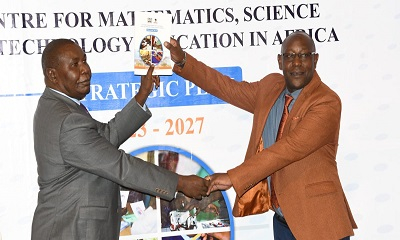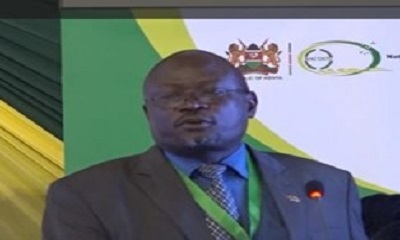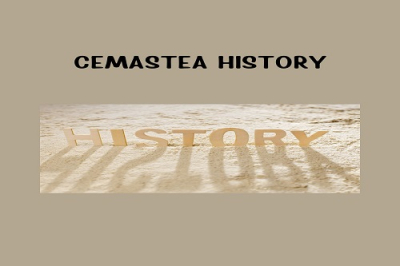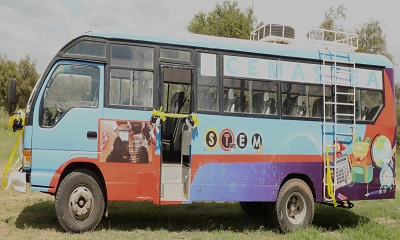CEMASTEA News 174
Children categories
Article by: Rahab Chiira and Winfred Magu
Photos by: Winfred Magu
The Centre for Mathematics, Science and Technology Education in Africa (CEMASTEA) conducted a three-day workshop for INSET Centre Principals, from 12th -14th August, 2024, at CEMASTEA. The workshop, theme “Enhancing Management of CEMASTEA Activities at the County Level for Effective Implementation of STEM Education,” brought together principals of INSET centers from across the country to focus on improving the quality and management of INSET centers.
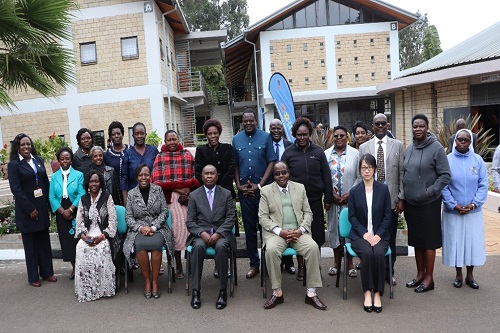
Seated front row Left to Right: Mrs. Jacinta Akatsa- CEO, CEMASTEA, Dr. Pius Mutisya, OGW-Chair Board of Governors CEMASTEA, Mr. Patrick Kogolla, Ag. Director STEM, Training, Professor Ami Ikeda- Hishorima University, INSET Principals and Staff from CEMASTE pose for a group photo during the Opening ceremony held on August 12, 2024 at CEMASTEA
The workshop was officially opened by Dr. Pius Mutisya, OGW-Chair of the CEMASTEA Board of Governors. In his opening address, Dr. Mutisya highlighted the critical role INSET Centre Principals play in the effective implementation of CEMASTEA’s training programmes at the counties. He emphasized the need for effective management of resources at the county level, ensuring that STEM education is accessible and equitable for all learners. Dr. Mutisya also reiterated CEMASTEA’s commitment to supporting capacity development programmes to ensure quality teaching and learning across the country.
CEMASTEA’s Chief Executive Officer, Mrs. Jacinta Akatsa, HSC also addressed the participants during the opening ceremony. Mrs. Akatsa welcomed the principals and underscored CEMASTEA’s vision of building a creative and innovative STEM society in Africa. She urged participants to take an active role in providing strategic leadership within their respective counties and schools, in ensuring the smooth implementation of cascaded training programmes. She stressed the importance of aligning with CEMASTEA’s mission of continuously developing capacity in STEM education through training, research, and innovation.
Throughout the workshop, the principals engaged in discussions on the challenges they face in managing INSET centers and explored practical strategies for improving the hosting of teacher training programmes. Among the topics covered were prudent financial management of STEM resources, compliance with procurement laws, and promoting teacher professional development. Participants also shared feedback on CEMASTEA activities and research findings, providing valuable insights into the impact of teacher capacity development programmes.
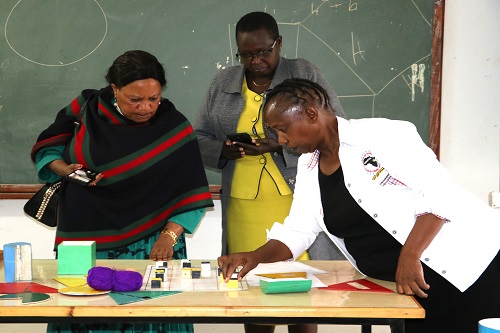
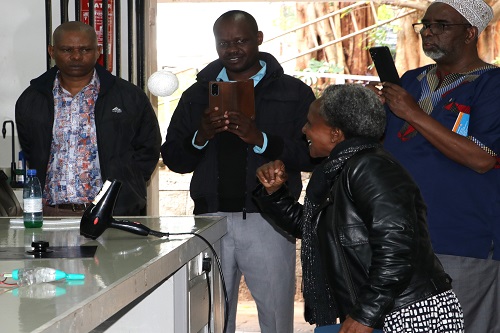
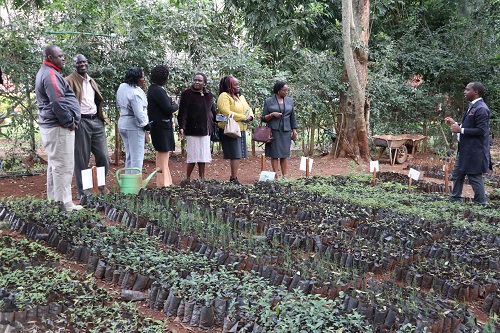
INSET Principals participating in the various hands-on activities
Left to right: A tour of CEMASTEA facilities, in the mathematics and innovations rooms respectively where they engaged with various teaching and learning resources and a visit to the tree nursery where they were sensitized on the various tree species.
During the closing ceremony, Dr. William K. Sugut, Director of Secondary Education at the Ministry of Education, commended CEMASTEA for its efforts in organising the workshop. He emphasized the Ministry's commitment to supporting CEMASTEA's intervention programmes in STEM education, particularly in enhancing the quality of training provided at the county level. Dr. Sugut called upon the INSET center principals to maintain a high standard in managing the INSET Centres, ensuring that resources are effectively utilized and that training environments are conducive to learning.
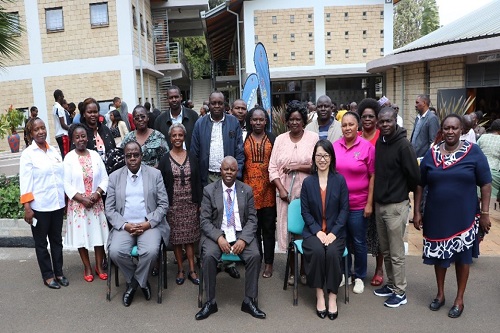
Seated front row Left to Right: Mr. Patrick Kogolla, Ag. Director STEM, Training, Dr. William K. Sugut, Director of Secondary Education- Ministry of Education, Professor Ami Ikeda- Hishorima University, INSET Principals and Staff from CEMASTE pose for a group photo during the Opening ceremony held on August 14,2024 at CEMASTEA
In her closing remarks, Mrs. Akatsa expressed her gratitude to the participants and staff for their dedication throughout the workshop. She noted that the objectives of the workshop had been achieved, with participants gaining new insights into managing county-level training programs. Mrs. Akatsa encouraged the principals to implement the workshop’s resolutions and translate them into actionable strategies within their schools to further enhance STEM education.
The three-day workshop concluded with a renewed commitment to improving the management of CEMASTEA activities across the country, ensuring the continued success of STEM education programs.
Article by: John Livingstone Makanda and Winfred Magu
Photos: Winfred Magu
CEMASTEA successfully hosted a week-long training program from 2nd to 6th September 2024, aimed at enhancing the competencies of teachers from Rwanda’s Liquidnet Family High School @ The Agaho-Shalom Youth Village (LFHS@ASYV) and Gashora Girls Academy of Science and Technology (GGAST). The training focused on integrating holistic learning practices to develop well-rounded, innovative, and emotionally resilient learners. The training was themed Enhancing teachers’ competences in implementing holistic learning.
The Course Objectives were to:
- Implement learner centered lessons that promote critical thinking and problem solving;
- Infuse Social Emotional Learning (SEL) approach in teaching/learning to produce an all-round learner;
- Apply appropriate knowledge and skills on mental health issues and provide psychosocial support to learners.
- Appreciate the role of teachers in implementing holistic learner development.
During the opening ceremony, Dr. Belio Kipsang, the Principal Secretary in the Ministry of Education’s State Department for Basic Education, was represented by Mr. Yusuf Karuyu- Director Teacher Management MOE and Board Member CEMASTEA while reading the speech emphasized the importance of the initiative. He commended the longstanding partnership between Kenya and Rwanda, noting that the course reflected a shared commitment to building an education system that nurtures not only knowledge but also creativity and innovation among learners. He reiterated that education plays a pivotal role in shaping the future of society and stressed that holistic learning was essential to preparing young people for the challenges of the 21st century.
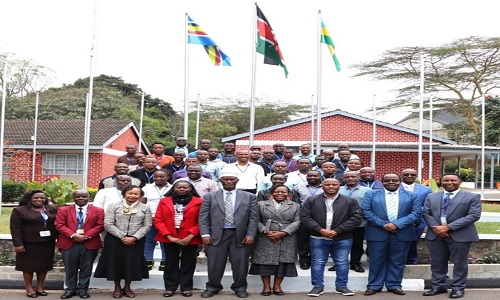
Front row left to right: Mrs. Clotilda Murambi, Mr. John Livingstone Makanda, Ngina Kairu, Member, Board of Governors, CEMASTEA, Mrs. Stella Wayianzuvuko- Principal, LFHS@ASYV, Mr. Yusuf Karayu- Director Teacher Management, MOE and Board Member- CEMASTEA, Mrs. Jacinta Akatsa, HSC, CEO- CEMASTEA, Habiyambere Theophile GGAST-Deputy Principal, Mr. Patrick Kogolla Ag. Director STEM- CEMASTEA and Martin Mungai, teachers and CEMASTEA staff pose for a group photo during the opening ceremony held on September 2, 2024
The training aligned with international frameworks, including the United Nations’ 2030 Agenda for Sustainable Development and the African Union’s Agenda 2063, which focused on inclusive growth and sustainable development. Dr. Kipsang explained how the program aimed to enhance teachers' pedagogical skills through learner-centered practices, incorporating components such as Social Emotional Learning (SEL), mental health, psychosocial support, and learning through play. He noted that these approaches would enable teachers to address the evolving educational needs of students.
He encouraged them to take full advantage of the training, exchange ideas, and apply the knowledge and skills gained in their respective schools. He praised CEMASTEA for its commitment to advancing teacher education across Africa, assuring the participants that they were in capable hands throughout the course.
Speaking during the closing ceremony, Ms. Stella Wayianzuvuko, Admin Principal at LFHS@ASYV, noted that the week-long workshop sparked creativity among participants, which was evident in the various sessions. She encouraged the teachers to introduce activities that integrate play into learning, particularly for demystifying STEM subjects. On Gender Responsive Pedagogy, she advised them not to impose knowledge on students but to foster an inclusive approach. Lastly, she urged the participants to implement what they had learned and promote peer teaching, emphasizing their shared goal of student success.
The closing ceremony, led by CEMASTEA’s Chief Executive Officer, Jacinta L. Akatsa, HSC, marked the successful conclusion of the program. Ms. Akatsa commended the participants for their dedication and active engagement throughout the week. Reflecting on the central theme of holistic learning, she emphasized that it involves nurturing not just the intellect but also the body and spirit. She encouraged the teachers to continue expanding their knowledge and skills, highlighting that the competencies developed during the training would have lasting benefits for both educators and students.
Ms. Akatsa also acknowledged CEMASTEA’s strong focus on STEM education, expressing her hope that the participants would return to their schools with practical strategies for implementing holistic learning. She praised CEMASTEA's facilitators and technical staff for their role in ensuring the success of the training.
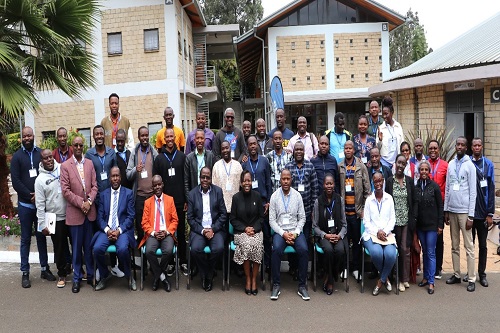
Front row Seated: Mr. Isaac Gathambiri, Mr. John Livingstone Makanda, Mr. Patrick Kogolla Ag. Director STEM- CEMASTEA, Mrs. Jacinta Akatsa, HSC, CEO CEMASTEA- Chief Guest, Habiyambere Theophile GGAST-Deputy Principal, Ms. Stella Wayianzuvuko- Principal, LFHS@ASYV, Samiah Millycent, GGAST- Rwanda, teachers and CEMASTEA staff pose for a group photo during the closing ceremony held on September 9, 2024
In her closing remarks, Ms. Akatsa lauded the teachers for their resilience and enthusiasm and expressed optimism that the collaboration between CEMASTEA and the Rwandan schools would lead to enduring improvements in educational practices. She extended her best wishes to the participants, urging them to share their experiences and insights with their schools.
The successful completion of the training reinforced the strength of cross-border partnerships in education. CEMASTEA reaffirmed its commitment to supporting the professional development of teachers and enhancing the quality of education across the continent.
The sessions which were highly interactive saw the participants involved in hands on activities.
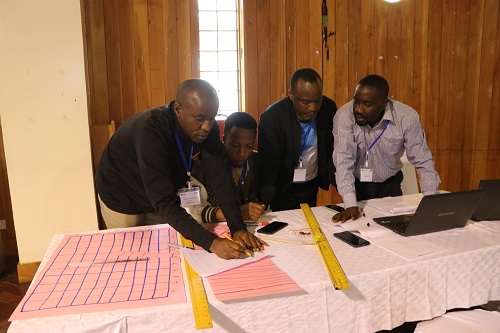

Participants engaging in various hands-on activities during the weeklong training
By LMakanda/AMumbi/WMagu/DOrero
The collaborative efforts between CEMASTEA and the Directorate of Quality Assurance and Standards are set to significantly improve the quality of STEM education in Kenya's early learning and basic education institutions. By fostering communities of good practice and promoting STEM-related activities, the basic education sector will be transformed to meet the aspirations of learners, teachers, parents, and other stakeholders. They have also started a collaborative programme for supporting the Junior Secondary (JS) teachers at school level to actualize learner centered strategies such as inquiry-based learning that forms part of what the teachers are trained on. The mission of CEMASTEA is to continuously develop competencies for sustainable development through Science, Technology, Engineering and Mathematics (STEM) Education. The Centre therefore seeks to build capacities in STEM education by nurturing talents in STEM at the basic education to eventually create a sufficient pool of learners with interest in pursuing the STEM Pathway at Senior School, STEM related courses in higher education and STEM related careers. With the support of the Ministry of Education CEMASTEA has continuously enhanced the capacity of JS teachers handling the STEM related learning areas.
A three-day training, themed: “Enhancing the capacity of QASO to monitor and support JS Teachers of STEM related subjects for effective implementation of the Competency Based Curriculum that targeted 358 Quality Standards and Assurance Officers (QASOs) based at the sub-county and county levels and drawn from 47 counties, as well as some from MoE headquarters took place from 27th to 29th May 2024 running concurrently in three training venues namely; Kakamega Nakuru and Machakos.
The training aimed at sharpening the QASO’S knowledge and skills to ensure effective and successful delivery of support to teachers in Junior school and to reflect and strategize on effective implementation of the Competency-Based Curriculum (CBC). It focused on the topical areas in education such as Feedback on Classroom lesson observation, interpretation of Curriculum Designs, Learner Centred Pedagogies and ICT Management Tools and Curriculum Delivery Support, related activities in STEM education, and topics that related to their work. The training was presided over by Dr. Pius Mutisya, OGW, Chairman of Board of Directors, CEMASTEA, CEO CEMASTEA, Mrs. Jacinta Akatsa, HSC and guests from the Ministry of Education.
While applauding CEMASTEA for setting up very high standards in training for STEM, the guests emphasized the important role CEMASTEA plays in Training and Research. The theme of the training was noted to provide an opportunity for in-depth discussion on various aspects such as: Evaluating lessons for effective teacher support, describing learner-centered approaches; Understanding lesson study; Developing strategies for teacher support; and appreciating the role of QASOs in supporting teachers.
Chief guests during the opening and closing ceremonies. From left: Dr. Pius Mutisya, OGW, Chairman of Board of Directors, CEMASTEA Dr. William Sugut, Head - Senior School Directorate, Dr. Gichuhi Ndegwa, Deputy Head - Directorate of Policy, Partnership and East Africa Community Affairs, Regional Director of Education (RDE) Eastern Region, Mr. Fredrick Kiiru, Regional Director of Education Rift Valley, Mr. Milton Nzyoka
The importance of collaboration and cohesion in enhancing the quality of STEM education was underscored. Participants were urged to provide leadership in the areas of their respective responsibility, noting the need for QASO’s to support the JS teachers even as they carried out curriculum implementation. Quality Standards and Assurance Officers it was noted, provided pedagogical leadership and monitoring curriculum delivery. Working collaboratively with the Ministry of Education would ensure 60% transition of the JS learners to the STEM pathway in Senior School would be achieved, which would eventually transform STEM education in Kenya.
The Head - Directorate of Quality Assurance and Standards, Madam Evelyne Owoko reiterated that the Directorate plays a critical role in the education sector, as it is tasked with ensuring the overall success of the education reforms hence play a critical role in curriculum implementation. Ms. Okowo reminded the QASOs of their mandate: to monitor and evaluate the standards and quality of education as it gives an opportunity to professionally inform policy. She highlighted the importance of pedagogical content knowledge, which enables teachers to synthesize pedagogical and subject matter knowledge for effective lesson planning and delivery. She noted that varied pedagogical skills help teachers tailor their lessons to meet different students' needs, thereby improving lesson delivery and learning experiences. She stressed that QASOs are essential in supporting teachers through school-based monitoring and providing timely feedback. This support extends to school administrators, ensuring quality education and effective governance.
Representing the Director of Quality Assurance and Standard, MoE: From left; Mary Mullu in Nakuru, Mr. Joseph Wambua in Kakamega and Mr. Lawrence Kaburu in Machakos
Ms. Owoko reiterated that the training aimed to equip QASOs with the skills necessary to support teachers, particularly in STEM subjects. She called upon participants to maximize their engagement during the training to enhance their pedagogical skills and knowledge. The participants were encouraged to embrace long life learning and the importance of being abreast with the current technologies that would ensure that they meet the stakeholders’ expectations. She encouraged QASOs to mentor and coach teachers in order to enhance curriculum delivery skills.
It was evident that Quality and Standards Officers play an instrumental role to ensure sustainable implementation of STEM education in schools leading to effective and efficient Curriculum Implementation and the success of CBC. By ensuring quality in education which needed to regain its center stage for. This would depend not just on its planning and implementation but on continuous improvement using data and information from the field. Consequently, the collection and analysis of the data on the quality and standards of practices is feedback in education through sustained monitoring, evaluation and support of school leadership and instructional practices was an integral part of providing quality education in the implementation of CBC.
Mrs. Jacinta Akatsa, HSC addressing participants during the closing ceremony of the QASO workshop in Kakamega.
Representing the CEO CEMASTEA in other regions were from left: Madam Lydia Muriithi, Deputy Director, CEMASTEA in Nakuru, and Mr. Patrick Kogolla in Machakos.
Participants were appreciated for their active participation and deliberations as the training had provided an opportunity for both participants and CEMASTEA to reflect and strategize on how to ensure effective implementation of CBC and related activities in STEM education. They were challenged to dream big, practice what they have learnt and help ensure success in STEM education even as they went about their duties.
Following the training that had brought together, QASOs from MoE headquarters, Regional, County, and Sub-Counties across the 47 Counties, held in three Centres; Kakamega, Machakos and Nakuru, participants were able to evaluate lessons for effective teacher support at classroom level; Describe learner centered approaches that promote effective implementation of the curriculum; Demonstrate understanding of lesson study as a form of teacher support at school level; Develop strategies for teachers support at school level for improved learning outcomes; and Appreciate their role in supporting JS teachers at school level for effective curriculum implementation.
By PKogolla/WMagu /Blessing Kemunto
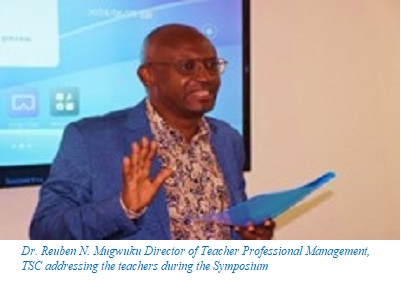 CEMASTEA’s primary mission is to continually enhance teacher proficiency in Pedagogical Content Knowledge (PCK) through In-Service Education and Training (INSET). Over time, CEMASTEA has trained educators in learner-centered strategies such as Inquiry-Based Learning (IBL), Problem-Based Learning (PBL), Lesson study, and ICT integration for teaching and learning. During training, teachers model lessons and share their teaching and learning experiences.
CEMASTEA’s primary mission is to continually enhance teacher proficiency in Pedagogical Content Knowledge (PCK) through In-Service Education and Training (INSET). Over time, CEMASTEA has trained educators in learner-centered strategies such as Inquiry-Based Learning (IBL), Problem-Based Learning (PBL), Lesson study, and ICT integration for teaching and learning. During training, teachers model lessons and share their teaching and learning experiences.
Recently, a pilot symposium was held at CEMASTEA on June 29, 2024, with the aim to inform the scaling up of this activity in subsequent years. The symposium targeted four counties: Nairobi, Machakos, Kiambu, and Kajiado. It brought together science and mathematics teachers from Junior Schools and Secondary Schools, along with other educators, to exchange best practices in the classroom.
The specific objectives of the symposium were to: Share innovative classroom practices; Facilitate knowledge and skill exchange among teachers for effective implementation of innovative approaches and Establish communities of practice among teachers, providing a platform for collaboration and networking through the CEMASTEA website and portal. Participating teachers and stakeholders used the symposium as an opportunity to exchange ideas and collaborate on best classroom practices, aiming to enhance the quality of education provided to students. They explored innovative pedagogical approaches in science and mathematics education. Additionally, the forum allowed participants to connect with colleagues from different schools and regions, fostering community and collaboration within the education sector.
Overall, the science and mathematics teachers’ symposium at CEMASTEA serves as a valuable platform for professional growth, collaboration, and continuous improvement in STEM education. It contributes to advancing science, technology, engineering, and mathematics by facilitating the dissemination of discoveries and fostering dialogue among experts. Furthermore, the symposium aims to disseminate new insights into teaching and promote dialogue among educators. CEMASTEA plans to regularly organize teacher symposiums, providing an opportunity for teachers to learn from one another, address challenges, and promote innovation to continuously improve their classroom practices.
This initiative is particularly important as Kenya transitions to the Competency-Based Curriculum (CBC), emphasizing competencies such as collaboration and communication skills. The symposium plays a crucial role in promoting innovative classroom practices for learning mathematics and science. During the one-day pilot symposium at CEMASTEA, presentations of innovative lessons, as well as panel and plenary discussions on innovative classroom practices. Outstanding teachers who participated, prepared and recorded exemplary lessons, that identified outstanding innovations in the subject/learning area. were awarded.
Outstanding teachers in four categories receiving awards from CEO CEMASTEA, Mrs. Jacinta Akatsa, HSC
Nathaniel Melita from Sholinke Primary & Junior School Jane Francisca Sakwa from Pangani Girls School in Nairobi County in Kajiado County.
Daniel Njoroge from St.Josephine Bakhita Masinga in Machakos. Faith Maghas from Athi River Gk Prison School in Kajiado County.
The Strategic Plan is a Roadmap for Achieving the Centre’s Vision and Mission. It Outlines Strategic Objectives, Strategies, And Resource Requirements for the 2023-2027 Strategic Period. The Plan Will Enable CEMASTEA Focus Its Efforts, Allocate Resources, And Measure Progress Towards Desired Outcomes. Mandate: Develop Capacity in STEM Education, Training and Research. Vision: An Empowered, Creative and Innovative STEM Society In Africa And. Mission: To Continuously Develop Capacity In STEM Education For Sustainable Development Through Training, Research, Innovation And Partnerships With Related Ecosystems.
Strategic Goals: The following are the strategic goals for the Centre for the period 2023-2027Goal No. 1: Enhanced quality of teaching and learning
Goal No. 2: Increased evidence-based body of knowledge on STEM education
Goal No. 3: Realized stable resource base.
Goal No. 4: Increased partnerships, linkages and collaborations.
Goal No. 5: Enhanced governance and accountability.
Goal No. 6: Realized organizational effectiveness and efficiency.
Goal No. 7: Strengthened STEMI education, training and research in Africa.
Core Values: The aspirations of the Centre, as laid down in this Plan, will be anchored on the following core values: excellence, inclusivity, innovation, integrity, and sustainable impact.
Excellence: We strive for the highest standards of excellence, embracing a culture of continuous improvement and a commitment to quality in all its training, research and policy implementation programs.
Inclusivity: We promote inclusivity by creating an environment where all internal and external stakeholders feel valued, respected, and have a sense of belonging. The Centre will foster diversity, promote equal opportunities, embrace public participation and encourage divergent perspectives and inputs in running its programs.
Innovation: We foster a culture that encourages imagination, creativity, exploration of unconventional solutions, and pursuing ideas that challenge the status quo. The Centre will also promote the utilization of maker’s spaces and create platforms for showcasing ideas through STEM-based fairs and boot camps.
Integrity: We are dedicated to maintaining honesty, ethical conduct, and a steadfast commitment to doing what is right in all situations, whether in personal or professional pursuits. The Centre is committed to transparency and accountability, adhering to the highest standards and faithfully following the laws that govern its practices.
Sustainable Impact: We promote sustainable impact by making deliberate choices that contribute positively to the long-term well-being of our clients, society, the environment, and future generations. In the implementation of our programs, the Centre considers the economic, social, and environmental outcomes and aim to create sustainable benefits while minimizing the adverse effects.
23.6 Quality Policy Statement
The Centre for Mathematics, Science and Technology Education in Africa is committed to providing training to curriculum implementers and conducting educational research in a timely, efficient, and effective manner. The Centre is committed to satisfying customers, organizational, legal and ISO 9001:2015 requirements, and to the continual improvement of its quality management system.
| KRA | Strategic objective(s) | Strategies |
| KRA 1: Training and Competence Development | 1.1 To improve quality and relevance in all training programs | 1.1.1 Implementing needs-based training that addresses contemporary issues.1.1.2 Providing technical support for the implementation of the national STEM strategy and policy.1.1.3 Promoting creativity and innovation in STEM education.1.1.4 Promoting Education for Sustainable Development (ESD), particularly climate change actions. 1.1.5 Strengthening school-based teacher support programs. |
| 1.2: To enhance access, equity, gender parity and inclusivity in all training programs | 1.2.1 Increasing training opportunities for all curriculum implementers1.2.2 Promoting gender responsive pedagogy.1.2.3 Promoting equity, gender parity and inclusivity in STEM training for teachers1.2.4 Transform selected SNE schools to model STEM education | |
| 1.3: To increase e-learning utilization and ICT integration in STEM education. | 1.3.1 Promoting e-learning and ICT integration among the curriculum implementers of STEM education.1.3.2 Strengthening the e-learning platforms. | |
| KRA 2: Research, Development and Knowledge Management | 2.1: To enhance evidence-based STEM education. | 2.1.1 Strengthening research capacity in STEM education.2.1.2 Strengthening the quality of STEM education. |
| 2.2: To enhance knowledge management base. | 2.2.1 Strengthening research knowledge process management hub/repository | |
| KRA 3: Resource mobilization, partnerships and linkages | 3.1: To increase center’s resource base. | 3.1.1 Building resource mobilization capacity3.1.2 Enhancing business development function3.1.3 Enhancing resources from government’s allocations for strategic interventions. |
| 3.2 To enhance partnerships and linkages for improved competencies in STEM education. | 3.2.1 Expanding partnerships’ base for strategic interventions.3.2.2 Establishing strong linkages 3.2.3 Strengthening consultancy services portfolio | |
| KRA 4: Governance | 4.1: To improve corporate governance | 4.1.1 Strengthening the capacity of the board of governors4.1.2 Building capacity at the county committee levels.4.1.3 Strengthening organizational performance & productivity4.1.4 Implementing the Mwongozo code of governance for State Corporations and circulars issued by government. |
| 4.2: To enhance fiduciary assurance | 4.2.1 Enhancing the asset management4.2.2 Improving financial planning, budgeting and utilization.4.2.3 Strengthening the procurement process.4.2.4 Enhancing Risk-Based Audit (RBA). | |
| 4.3: To enhance environmental conservation. | 4.3.1 Increasing Forest cover under the national tree growing and restoration campaign.4.3.2 Enhancing e-waste management. | |
| KRA 5: Organizational strengthening | 5.1: To improve organizational visibility and strengthening effectiveness. | 5.1.1: Ensuring compliance to quality management system (QMS)5.1.2: Strengthening the Centre's corporate brand and visibility.5.1.3: Strengthening human capital 5.1.4: Improving infrastructural development and maintenance |
| 5.2: To increase the number of people accessing open resources. | 5.2.1: Enhancing digitization of documents and records5.2.2: Enhancing access and adaptation of teaching and learning resources | |
| 5.3: To enhance automation in key processes. | 5.3.1: Automating key processes5.3.2: Ensuring business continuity5.3.3: Enhancing safety and security of data & information | |
| KRA 6: Enhancing Science, Technology, Engineering, Mathematics and Innovations (STEMI) education. | 6.1 Strengthen CEMASTEA’s coordination role in promoting strategic interventions in STEMI education. | 6.1.1 Strengthening country chapters in member countries.6.1.2 Strengthening the continental secretariat functions.6.1.3 Enhancing CEMASTEA’s capacity to serve as an African Centre of excellence in STEMI education. |
| 6.2 To improve the policy environment that promotes STEMI education. | 6.2.1 Reviewing the policy framework for STEMI education and training environment6.2.2 Integrating diversity and inclusion into STEMI education and training in teacher professional development.6.2.3 Monitoring of policy environment and training programs continuously. | |
| 6.3 To improve STEMI education and training practices. | 6.3.1: Initiating African STEM curriculum reforms for greater relevance and flexibility.6.3.2: Initiating joint Africa teacher training and development programs.6.3.3 Integrating technology to Africa STEM training practices and pedagogy.6.3.4 Leveraging technology to scale STEM learning | |
| 6.4 To enhance STEMI research and development and knowledge management. | 6.4.1 Improving R&D in Africa STEMI domain to inform STEM policy, practice and research.6.4.2 Promoting knowledge sharing on innovative STEM practices | |
| 6.5 To strengthen collaboration and partnerships in STEMI education providers, industry leaders and policy makers. | 6.5.1 Promoting STEMI awareness and advocacy in Africa6.5.2 Enhancing global collaborations and partnerships in STEMI policy, research and practice |
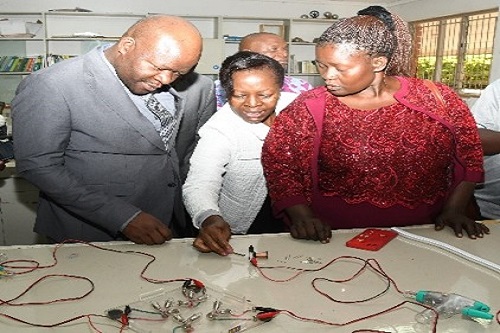
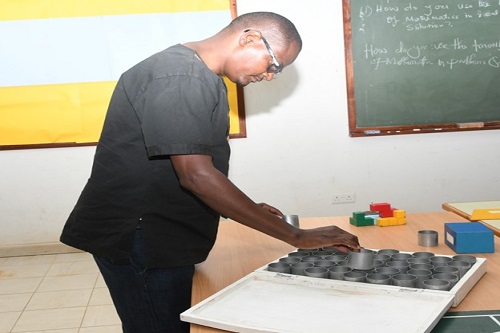
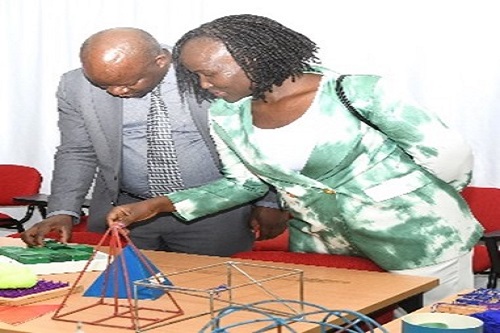
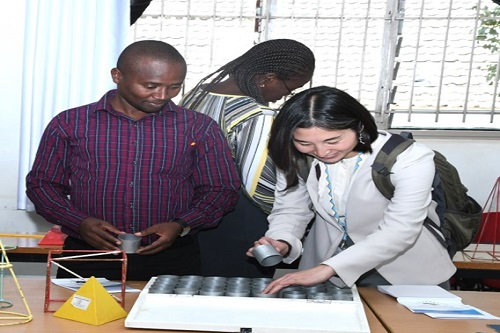
Guests interacting with the innovations at CEMASTEA during the launch of the Strategic Plan
By Clotilda Nyongesa
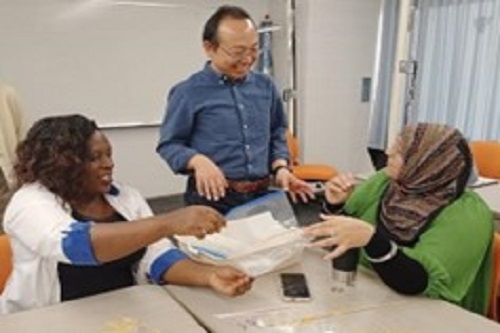 CEMASTEA, operating under the auspices of Ministry of Education, stands as a beacon of innovation and collaboration in pedagogical advancement.
CEMASTEA, operating under the auspices of Ministry of Education, stands as a beacon of innovation and collaboration in pedagogical advancement.
Tasked with researching and training teachers in pedagogical content knowledge, CEMASTEA's reach extends far beyond national borders, striving to enhance the skill sets of National Trainers on a global scale. At the heart of this endeavor lies a pivotal partnership with the Japan International Cooperation Agency (JICA), the visionary founders of the Strengthening, Mathematics, and Science Education (SMASE) program implemented by CEMASTEA.
JICA's commitment to capacity building has been instrumental in empowering national trainers, both in Kenya and through immersive experiences in Japan. Central to this collaboration is the Knowledge Co-Creation Programme (KCCP), that focuses on mutual learning fostering reciprocal relationships between developed and developing nations. This ethos of shared knowledge and growth was exemplified in the recent KCCP session held from October to November, 2023. Drawing participation from ten diverse countries including Egypt, Malawi, Kenya, Southern Sudan, Mongolia, the Philippines, Jamaica, Bangladesh and Palestine, the program facilitated vibrant exchanges on formative assessment practices. Participants were immersed in discussions and field visits to Japanese classrooms, gaining invaluable insights into the dynamic educational landscape of Japan.
A highlight of the experience was the exploration of "MITORI," a base of Japanese educational practice. MITORI typif ies a learner-centered approach, nurturing critical thinking skills by empowering teachers to discern and interpret the slightest cues from learners during the learning process. This nuanced understanding informs instructional decisions, driving meaningful progress towards lesson objectives. During our experience, we explored ‘MITORI,’ a fundamental aspect of Japanese educational practice. MITORI embodies a learner-focused approach, where teachers empower learners holistically, by carefully observing and interpreting the slightest cues from learners throughout the learning journey. This deep understanding guides instructional choices, leading to meaningful progress in achieving the learning outcomes.
Building on these invaluable insights, CEMASTEA has embarked on a transformative journey to tailor content for nationwide teacher training initiatives. This initiative places a strong emphasis on pedagogical content knowledge especially learner- centered practices, aligning with the implementation of the Competency-Based Curriculum (CBC) at the Junior School (JS) level, as guided by the Basic Education Curriculum Framework (BECF). Recognizing the pivotal role of highly knowledgeable and reflective teachers in effectively delivering the curriculum.
CEMASTEA’s tailored modules are thoughtfully designed to address the specific challenges faced by Junior School teachers. The training model typically follows a smart cascade, complemented by monitoring support and continuous learning. This approach ensures the practicability and effectiveness of the training materials within the classroom context, creating an environment conducive to learner success and holistic growth.
As CEMASTEA continues to pioneer innovative approaches to teacher development, its partnership with JICA serves as a beacon of collaboration and excellence, transcending borders to empower educators and nurture the next generation of global citizens.
By Makoba Kizito, Blessing Kemunto and Winfred Magu
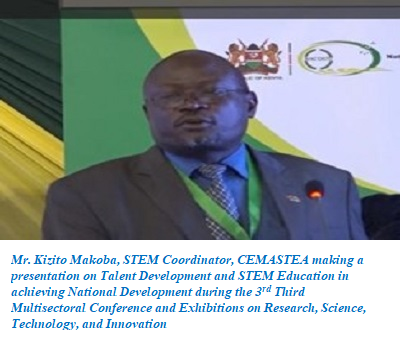 The Centre participated in the Third Multispectral Conference and Exhibitions on Research, Science, Technology, and Innovation. The conference was held from May 7–10, 2024, at the Safari Park Hotel in Kasarani, with the topic "Science, Technology, and Innovation as the Game Changer for National Security and Sustainable Prosperity," by the National Commission for Science, Technology, and Innovation (NACOSTI).
The Centre participated in the Third Multispectral Conference and Exhibitions on Research, Science, Technology, and Innovation. The conference was held from May 7–10, 2024, at the Safari Park Hotel in Kasarani, with the topic "Science, Technology, and Innovation as the Game Changer for National Security and Sustainable Prosperity," by the National Commission for Science, Technology, and Innovation (NACOSTI).
Kenya's future is brightened by CEMASTEA's dedication to nurturing the potential of the next generation in STEM fields. CEMASTEA equips students with the necessary skills and fosters a passion of creativity, enabling them to become resourceful individuals capable of devising solutions to the pressing issues confronting the nation. Mr. Makoba Kizito, coordinator of STEM innovations, presented the CEMASTEA’s paper on behalf of the CEO. The presentation was on the role of talent development and STEAM education in achieving national development goals.
According to Mr. Kizito, the purpose of STEM is to utilize the next generation to enhance the talent of the country. Additionally, because the institution is focused on STEM education, it emphasizes the value of developing students' talents through a variety of channels, including teaching and school leadership, which allows them to create their own career path. CEMASTEA aims to develop STEM education capacity in Africa through training, research, innovation, and partnerships with ecosystems, empowering young learners to realize their talents and become resourceful individuals for sustainable development.
The coordinator highlighted that CEMASTEA not only has teachers training programmes that are suitable in nurturing talents from primary and secondary school levels but also takes the initiative of monitoring and supporting them from their schools.
The next crucial facets of developing talent are STEM robotics boot camps and school visits. Learners can engage in these scenarios and get much more by using various learning tactics in a hands-on manner. Mr. Makoba reiterated that by encouraging students to use their imagination, creativity, and critical thinking abilities, CEMASTEA place-based learning improves their ability to innovate. STEM on Wheels is a CEMASTEA bus that functions as a mobile lab and is furnished with all the equipment required by students, according to Mr. Makoba Kizito during the conference.
CEMASTEA collaborates with the University of Waterloo and the University of Nairobi to carry out STEM projects that are designed to give students problem-solving skills. As a result, twelve students were eligible to advance to the STEM-based Olympiads' next phase. Makoba said that "this Olympiad gives teachers opportunity to train on how to develop items that promote problem solving skills."
Another method to foster talent development through STEM education is the centre’s adding of robots to the 13th category of the Kenya Science and Engineering Fair. This gives students the chance to take part in the Fair and showcase their creativity.
He pointed out that encouraging Education for Sustainable Development (ESD) in students adds values to their everyday life and the capacity to make connections between what they study and real experiences; as a result, insecurity would decrease and solutions will be developed for the country, particularly in the job sector.
The focus placed by CEMASTEA on hands-on learning, collaboration with many stakeholders, and practical problem-solving abilities ensures that Kenya's youth are equipped to steer the nation towards a safer and more sustainable future.
As we celebrate our Silver Jubilee, we honour the visionary leaders who have guided CEMASTEA to greater heights over the last quarter-century. The Centre has been blessed with remarkable leaders whose devotion, passion, and commitment have helped shape the institution's success and influence. These Kenyan and Japanese leaders dared to dream and envision a future for STEM education in Kenya and Africa. They displayed exceptional foresight, strategic thinking, and unshakable commitment in furthering CEMASTEA's objective and goals, taking sometimes unpopular but brave actions to make their vision a reality. Their transformative leadership paved the way for innovative programs and strategic partnerships that continue to empower teachers and educators, excite students, and catalyze positive change in Kenyan classrooms and across Africa.
Pioneer leaders for the Strengthening of Mathematics, Science in Secondary Education (SMASSE) Project in Kenya included Professor Karega Mutahi, then Permanent Secretary Ministry of Education, Mr Oyaya, then Chief Inspector of Schools (currently referred to Director of Quality Assurance); Mr Bernard Mbugua Njuguna, first Head of INSET Unit (that run the Project) at Kenya Science Teachers College(KSTC); the late Mr Samuel Kibe, a long time Education Consultant for JICA and advisor on STEM education for the SMASSE Project. Directors who have steered CEMASTEA include Mr. Obadiah Maganga, Hon. Mrs Peula Lelei, Mrs Lynette Kisaka, Mrs Cecilia Ngetich, Mr Moses Kawa, and Hon Mr. Stephen M. Njoroge. The Centre also had pioneer staff including the late Ms. July Ominde, Secretary; Ms Jane Marete Senior Administration officer and Mr. Alfred Muriithi, Senior Procurement Officer who made sure that administrative, office and project procurement issues were up to date.
On the Japanese side was the late Mr. Takahiko Sugiyama, first Chief Advisor for the SMASSE Project 1998-2008. Sugiyama oversaw the project spread in Kenya and to 34 countries in Africa with the establishment of SMASE Africa Association. Others included Prof. Shigekazu Takemura, a dedicated and globally renowned expert of Physics Education and Academic Advisor for the project, Mr. Keiichi Naganuma who succeeded Mr. Sugiyama as Chief Advisor, Atsushi Matachi, Academic Advisor, Hazuki Uchiyama, Science Education Expert and Noriaki Tanaka, Project Coordinator. Japan also sent numerous short-term experts in mathematics and science. The founding Kenyan counterparts for the SMASE project were; Dr. Marguerite Khakasa Miheso-O'Connor ,(Kenyatta University; Prof. Justus O. Inyega, University of Nairobi; the late Simon Kinyua, Regina Ng’anga, and Dr. Waitutu Michael (Kenyatta University).
These leaders’ visionary leadership and staff’s tireless dedication and unwavering commitment to duty laid the foundation for CEMASTEA's success. Their legacy continues to inspire CEMASTEA leadership as it strives to build a brighter and more prosperous future and the pursuit of excellence in STEM education. Indeed, the current leadership looks upon this rich history and draws inspiration to continue along this path of faith, inspiration, and excellence to impact future generations of educators, learners, for many years to come.
By Makoba Kizito
Effective teaching is characterized by a child's interest, motivation, and engagement. To do this, teachers must help children learn by having them observe, listen, explore, experiment, and ask questions. For 25 years, CEMASTEA has been training science and mathematics teachers about learner-cantered teaching strategies that inspire, involve, and spark interest in STEM. Throughout this time, however, the Centre has not had programmes that have direct contact with learners other than when they visit the Centre or during classroom-based activities such as lesson observation during research. When learners visit CEMASTEA, they get a chance to experience science and mathematics, and how they are applied in everyday life. The Centre features a makers-space, innovation math and science rooms, and the state-of-the-art laboratories. The experiences assist learners view mathematics and science from an angle of play and place-based perspectives. However, only a few learners can visit the Centre at a particular time.
Esther Nyambura, ICT department interacting with young STEMists
In an effort to have more learners experience STEM education, ensure equity in light of the positive feedback from the learners and, the steadily growing requests from schools for visits, the Centre started the STEM outreach programme. We coined the slogan: "If all learners cannot come to CEMASTEA, we go to the schools". This is how the concept of the ‘STEM on Wheels’ was born. The goal was to bring STEM experiences right in the contexts of the learners. ‘STEM on Wheels’ brings a mobile STEM lab (bus) to schools, allowing learners and teachers to participate individually and as groups in hands-on activities and experiments. The program is designed to engage learners in STEM subjects and help them develop critical mathematical and science thinking, problem-solving, engineering, and science and mathematical communication skills. The program is run by experienced educators and volunteers who guide learners through the activities as they provide support and encouragement. Learner-driven science experiments, mathematics and science-related activities, robotics, coding, critical thinking, and problem-solving exercises, and Education for Sustainable Development (ESD), are some of the STEM-related activities on offer during the outreaches.



